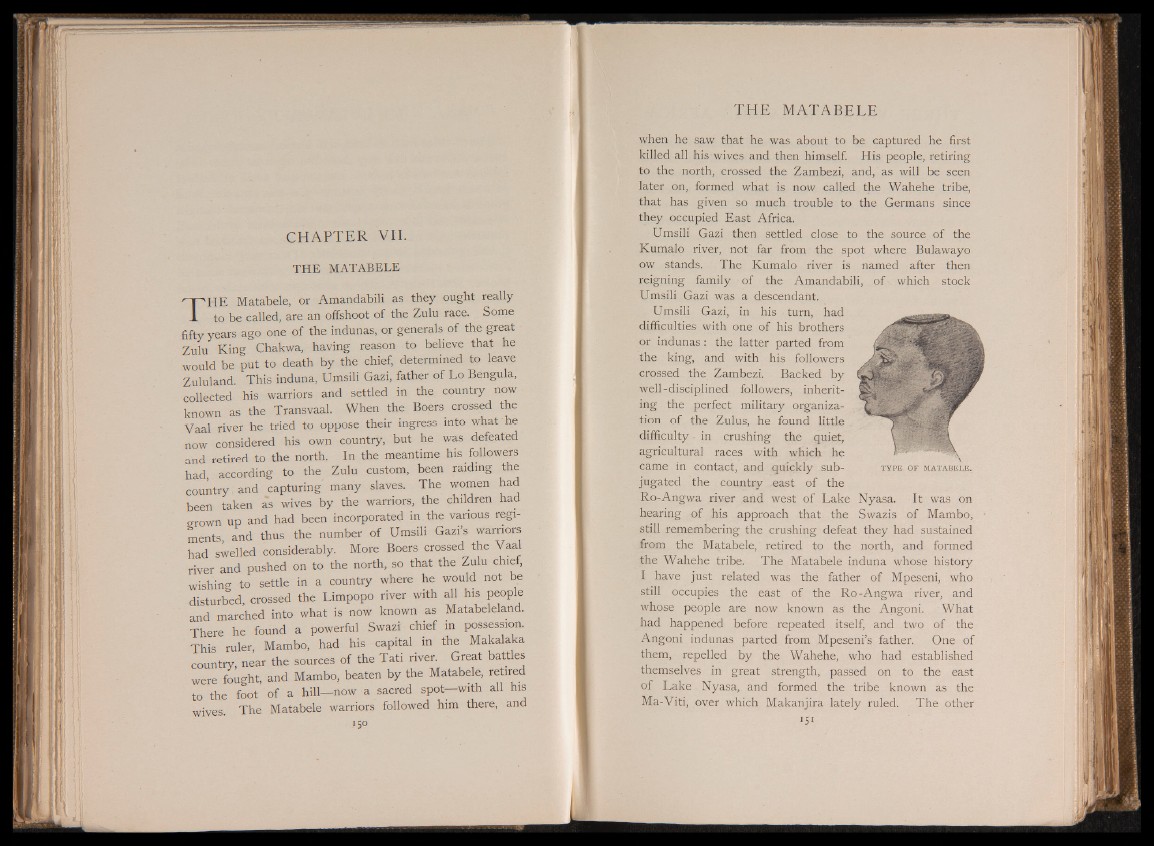
C H A P T E R VI I .
THE MATABELE
/'T ''H E Matabele, or Amandabili as they ought really
A to be called, are an offshoot of the Zulu race. Some
fifty years ago one of the indunas, or generals of the great
Zulu King Chakwa, having reason to believe that he
would be put to death by the chief, determined to leave
Zululand This induna, Umsili Gazi, father of Lo Bengula,
collected his warriors and settled in the country now
known as the Transvaal. When the Boers crossed the
Vaal river he tried to oppose their ingress into what he
now considered his own country, but he was defeated
and retired to the north. In the meantime his followers
had according to the Zulu custom, been raiding the
com Jy and capturing many slaves. The women had
been taken as wives by the warriors, the children had
erown up and had been incorporated in the various regiments,
and thus the number of Umsili Gazi’s warriors
had swelled considerably. More Boers crossed the Vaal
river and pushed on to the north, so that the Zulu chief,
wishing to settle in a country where he would not be
disturbed, crossed the Limpopo river with all his people
and marched into what is now known as Matabeleland.
There he found a powerful Swazi chief in possession.
This ruler, Mambo, had his capital in the Makalaka
country, near the sources of the Tati river. Great battles
were fought, and Mambo, beaten by the Matabele, retired
to the foot of a hill—now a sacred spot—with all his
wives. The Matabele warriors followed him there, and
150
when he saw that he was about to be captured he first
killed all his wives and then himself. His people, retiring
to the north, crossed the Zambezi, and, as will be seen
later on, formed what is now called the Wahehe tribe,
that has given so much trouble to the Germans since
they occupied East Africa.
Umsili Gazi then settled close to the source of the
Kumalo river, not far from the spot where Bulawayo
ow stands. The Kumalo river is named after then
reigning family of the Amandabili, of which stock
Umsili Gazi was a descendant.
Umsili Gazi, in his turn, had
difficulties with one of his brothers
or indunas : the latter parted from
the king, and with his followers
crossed the Zambezi. Backed by
well-disciplined followers, inheriting
the perfect military organization
of the Zulus, he found little
difficulty - in crushing the quiet,
agricultural races with which he
came in contact, and quickly subjugated
the country east of the
Ro-Angwa river and west of Lake Nyasa. It was on
hearing of his approach that the Swazis of Mambo,
still remembering the crushing defeat they had sustained
from the Matabele, retired to the north, and formed
the Wahehe tribe. The Matabele induna whose history
I have just related was thé father of Mpeseni, who
still occupies the east of the Ro-Angwa river, and
whose people are now known as the Angoni. What
had happened before repeated itself, and two of the
Angoni indunas parted from Mpeseni’s father. One of
them, repelled by the Wahehe, who had established
themselves in great strength, passed on to the east
of Lake Nyasa, and formed the tribe known as the
Ma-Viti, over which Makanjira lately ruled. The other
m
T Y P E OF MATABELE,